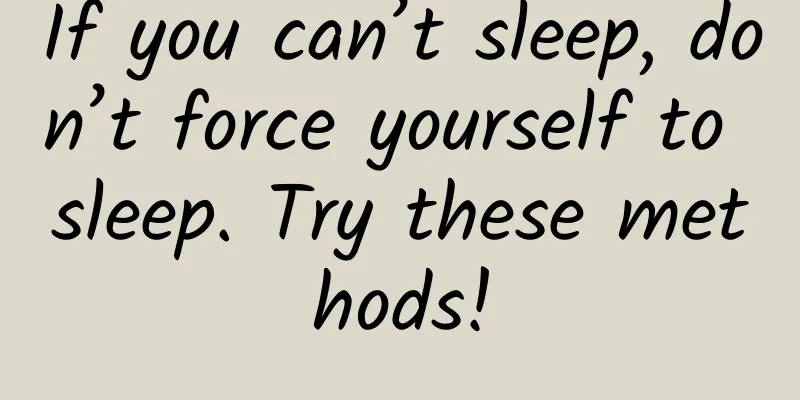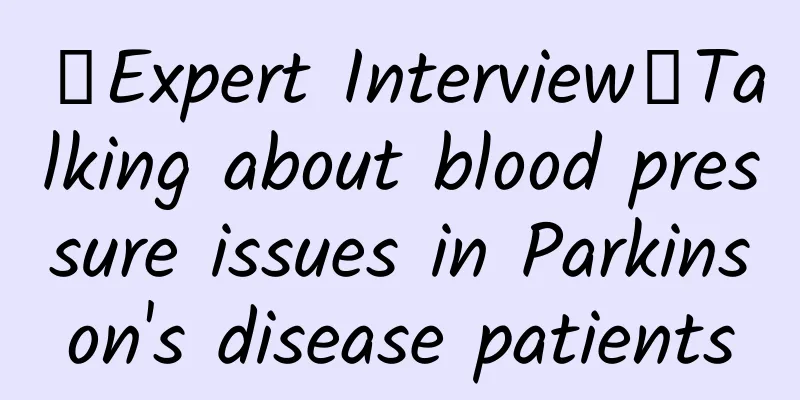If you can’t sleep, don’t force yourself to sleep. Try these methods!

|
About one-third of our lives are spent sleeping, and "sleeping enough and sleeping well" are important for our condition and health the next day. However, according to the "China Sleep Big Data Report" released by the China Sleep Research Society and other institutions in 2023, the incidence of insomnia among Chinese adults is as high as 38.2%, and the number of people with sleep disorders is as high as 510 million. Copyright images in the gallery. Reprinting and using them may lead to copyright disputes. Many friends have also discussed their sleep problems on social media, and there are often hot searches such as "Should I continue to sleep after waking up at night?" and "Should I force myself to sleep if I can't fall asleep?" It is necessary to care about sleep because long-term insomnia will reduce our physical and mental health and quality of life, such as increasing the risk of cardiovascular disease, diabetes, physical and mental illnesses such as anxiety and depression, and causing problems such as emotional instability, increased psychological stress and cognitive impairment, thus affecting people's normal work and life. Today, let’s talk about how to determine whether you have sleep disorders and what methods can improve your sleep. Do you have sleeping disorders? Everyone may encounter some sleep problems in their life, sometimes it may be due to recent stress, mental tension caused by important events, sometimes it may be due to physical discomfort, taking medicine, drinking coffee, etc. Although poor sleep will make us feel tired, depressed and other uncomfortable feelings the next day, these sleep problems are often short-term, and sleep may return to normal after a few days or a week or two, so they will not have a long-term impact on our physical and mental health. It should be noted that if short-term sleep problems are not improved, or even become more severe and last longer, they may develop into sleep disorders, also known as insomnia. So how do you distinguish between occasional insomnia and sleep disorders, also known as insomnia? Insomnia is generally assessed from three dimensions: sleep duration, sleep quality, and its impact on individuals. According to the European Insomnia Guidelines and the Diagnostic and Statistical Manual of Mental Disorders, Fifth Edition, if a person has the following symptoms at least three times a week in the past three months, he or she may be suffering from insomnia: A. Difficulty falling asleep: also known as sleep latency, which refers to the time required from preparing to sleep to actually falling asleep. Generally, a sleep latency of less than 30 minutes is normal. Frequently exceeding 30 minutes is one of the important diagnostic criteria for insomnia. B. Difficulty maintaining sleep: It is characterized by frequent waking up at night and difficulty in falling asleep again. Some people may also wake up earlier than expected and then find it difficult to fall asleep again. C. Sleep disorders lead to daily problems: such as feeling tired, depressed or irritable during the day, and having difficulty concentrating, which seriously affect people's studies, work and daily life. In addition to the above three important diagnostic criteria, other exclusion criteria must be met, including: A. Despite having adequate opportunity to sleep, i.e., without external factors affecting their sleep, they still have difficulty sleeping. B. Cannot be attributed to the physiological effects of a substance, such as some drugs that affect sleep. C. cannot be adequately explained by other coexisting physical and mental disorders, such as breathing-related sleep disorders, circadian rhythm sleep-wake disorders, etc. Can’t sleep? Try CBT-I We all know that taking melatonin, sleeping pills and sedatives can make us fall asleep more easily. However, for most people, drug treatment may not be the first choice because drugs are often prone to dependence, tolerance and other side effects. Therefore, psychologists who study sleep have proposed Cognitive Behavioral Therapy for Insomnia (CBT-I), the principle of which is to identify and address the multiple cognitive and behavioral factors that persist in insomnia. Copyright images in the gallery. Reprinting and using them may lead to copyright disputes. As a non-drug treatment, after a long period of empirical research, CBT-I has become the first choice for treating insomnia. It can produce obvious results in about 2-4 weeks. Its effect is comparable to that of drugs, and the effect lasts longer. A paper published in the academic journal The Lancet in 2023 demonstrated the effectiveness of this therapy. The study recruited 642 patients with insomnia, half of whom received sleep restriction therapy (one of the behavioral therapies of CBT-I). The results showed that in the 6-month follow-up, 2/3 of the patients completed all the treatments and their insomnia severity index decreased significantly, indicating that CBT-I is an insomnia treatment with high patient compliance, easy implementation, and good results. In addition to its excellent effects, cognitive behavioral therapy for insomnia has another important feature: it does not require reliance on the guidance of professionals. Everyone can use the methods independently to improve their sleep. Therefore, when you find that you have serious sleep problems in recent period and it has affected your normal study, work and life, you can use these methods to adjust your sleep. If you really can’t fall asleep, do you need to “force yourself to sleep”? Try to make sure you only go to bed when you feel sleepy. If you can't fall asleep after lying in bed for 20-30 minutes, or start to have wild thoughts as soon as you get to bed, it is recommended that you get out of bed and do some relaxing activities until you feel sleepy, and then go back to bed to continue sleeping. In addition, the following methods will help: 1 Create a good sleeping environment Make sure your sleeping environment is quiet, comfortable, warm, and dim. Use blackout curtains, earplugs, or white noise to reduce distractions and noise and create a good sleeping atmosphere. 2 Determine your bed time Record your sleep time, wake-up time, and actual sleep time every night, and calculate your average actual sleep time per night (you can use a wristband and health management apps). This will become your bed time, that is, during this time you only stay in bed and try to stay calm and relaxed. 3 Create and flexibly adjust your sleep schedule If you spend more time in bed than sleeping because you can't fall asleep, you can set the initial time in bed to the actual time in bed minus 1 hour, and gradually increase the time in bed according to the quality and effect of sleep. This helps us improve sleep efficiency, that is, the ratio of sleeping time to time in bed. When the sleep efficiency is greater than 85%, it means that our sleep is normal, which can also be used to evaluate our sleep quality. 4 Keep bedtime and wake-up time regular Establish a regular sleep schedule that suits your needs and daily routine, going to bed at the same time every day and getting up at the same time in the morning, regardless of the amount and quality of sleep you got the night before. Maintaining a regular sleep schedule helps adjust your body clock and establish better sleep habits. 5 Only perform sleep-related activities in bed When you sit or lie in bed, only do some sleep-related activities, such as sleeping, relaxing, reading, or listening to music. Avoid activities that are not conducive to sleep, such as watching TV, using mobile phones or tablets in bed. This helps to associate the bed with sleep and improve sleep efficiency. Copyright images in the gallery. Reprinting and using them may lead to copyright disputes. 6 Avoid stimulating activities when getting up in the middle of the night If you need to leave the bed, choose some calm and relaxing activities, such as stretching, reading, etc., and do it in a dimly lit environment, avoiding more stimulating activities and bright lights. This will help keep your body and mind relaxed and promote sleep. 7 Control nap time and frequency Taking naps that are too long or too frequent may affect your sleep quality and difficulty falling asleep at night. If you have the habit of taking naps, you can limit the nap time and reduce the frequency of naps. A nap of 10-20 minutes is better, which can provide quick relaxation and recovery, but will not affect your sleepiness at night. 8 Perform relaxing activities before bed First, you can establish a daily routine before going to bed, such as brushing your teeth, washing your face, and wearing pajamas, which helps send signals to your body that you are ready to fall asleep. Secondly, you can do deep breathing exercises, meditation, or gentle stretching exercises before going to bed to relax tense muscles, which helps lower your heart rate and relax your nervous system, thereby promoting a quick fall asleep. Finally, insomnia often does not occur alone. Almost any mental disorder is often accompanied by insomnia symptoms. When a person also suffers from other mental disorders, such as anxiety disorders, depression disorders, or bipolar disorder, it is not enough to use cognitive behavioral therapy for insomnia alone. It may also be necessary to receive evaluation, diagnosis and treatment from professionals, treat other mental disorders, and supplement cognitive behavioral therapy for insomnia to fundamentally solve the problem of insomnia. References [1] Riemann, D., Espie, CA, Altena, E., Arnardottir, ES, Baglioni, C., Bassetti, CL,... & Spiegelhalder, K. (2023). The European Insomnia Guideline: Anupdateonthediagnosisandtreatmentofinsomnia2023. Journal of sleepresearch, 32(6),e14035. [2] Kyle, SD, Siriwardena, AN, Espie, CA, Yang, Y., Petrou, S., Ogburn, E.,... & Aveyard, P. (2023). Clinical and cost-effectiveness of nurse-delivered sleep restriction therapy for insomnia primary care (HABIT): apragmatic, superiority, open-label, randomised controlled trial. The Lancet, 402(10406),975-987. [3]Verreault, MD, Granger, É., Neveu, Planning and production Author: Chen Yufeng, Master of Developmental and Educational Psychology Reviewer: Yang Xiaoyang, Associate Professor, School of Psychology, Sichuan Normal University |
>>: Uncover the truth behind abdominal bloating and edema, and unlock tips for coping with it!
Recommend
A woman has a little urgency to urinate and blood in urine
The reproductive structure of women is relatively...
Why do I feel itchy after my period?
Girls will have their periods every month, and ge...
Is it important to have high risk prenatal screening?
Women need to do many prenatal checkups during pr...
What can't pregnant women with blood sinus eat?
Many pregnant women find that they have placental...
Is it easiest to get pregnant 3 months after a miscarriage?
Pregnancy is very important for women, because pr...
Can pregnant women use douche?
Women should pay more attention to vaginal hygien...
How to replenish qi deficiency in girls
The blood and qi problem of women is the key to w...
Causes and treatment of black discharge before menstruation
We all know that every mature woman has a menstru...
What causes kidney deficiency in women?
Everyone thinks that only men will suffer from ki...
The temperature continues to rise in summer, so pay attention to these two common eye diseases!
In the hot summer, the continuous high temperatur...
How to better regulate dysmenorrhea and scanty menstruation?
Every woman will encounter the same difficult pro...
What are the misunderstandings about postpartum tonic
Women cannot eat arbitrarily after giving birth. ...
Can you still eat food that has just passed its expiration date by one or two days? Many people misunderstand these 4 points!
On March 27, the National Health Commission and t...
What should I do if I can’t tell the difference between a cold and allergic rhinitis?
The leaves gradually turn yellow, and the weather...
What should women eat if they have heart problems?
In recent years, with the gradual improvement of ...









